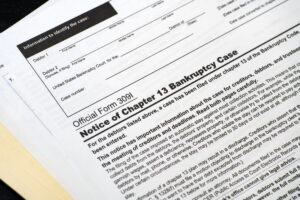
Downsides To Filing Chapter 13 Bankruptcy
At the end of nearly every Chapter 13 consultation, I get the same question: “What is the downside to filing Chapter 13 bankruptcy?”
After almost 13 years of getting this question, I still have only one answer. I’m going to give it to you, but let’s talk about what Chapter 13 bankruptcy is and what its benefits are first.
What Is Chapter 13 Bankruptcy?
Chapter 13 allows filers to reorganize their debt and forces creditors to accept a payment plan that the filer can afford.
A Chapter 13 repayment plan will typically last five years.
The primary factors that determine how much a filer will pay in a Chapter 13 are: their household income, their assets, and their debts. Each case is different. I’ve had clients who paid 1% of what they owed to their unsecured creditors and have had clients who have paid 100% of what they owed to their unsecured creditors.
What Are The Benefits To Filing Chapter 13 Bankruptcy?
The primary benefit of Chapter 13 bankruptcy is peace of mind.
Once you file bankruptcy, any creditor or debt collector who has been hounding you has to stop. They can’t call or email you. Foreclosures have to stop. Their lawsuits and garnishments also have to stop immediately.By immediately, I mean the moment I upload their petition to the bankruptcy court.
A Chapter 13 plan allows you to make just one monthly payment for your unsecured creditors, including taxes. You’ll still pay your mortgage and car loan directly, assuming you want to keep those things.
A Chapter 13 plan allows you to get caught up on your mortgage if you’ve fallen behind on payments. You’ll have five years to bring the mortgage current.
A Chapter 13 plan allows you to keep all of your assets. If you have an asset that is too valuable to keep in Chapter 7 bankruptcy, Chapter 13 might be a better option.
What Is The Downside To Filing Chapter 13 Bankruptcy?
Let’s not sugarcoat this. For all the benefits of Chapter 13 bankruptcy there is still one serious downside: you’re going to be attached to the bankruptcy court and trustee for five years. Your credit report will read that you’re in an active bankruptcy for that time and your financial life will be scrutinized more than it would be if you hadn’t filed bankruptcy. You may have to get the trustee’s permission to buy a car or a house (yes, that is definitely possible in Chapter 13 bankruptcy).
But does that downside outweigh all of the benefits? That’s a question you’ll have to answer for yourself.
If you can manage your debts and pay them off in five years without filing Chapter 13 bankruptcy, you should. If you need to stop a garnishment, foreclosure, lawsuits, phone calls and get help managing your debt, Chapter 13 is probably a good option.
Talk To An Experienced Denver, Colorado Chapter 13 Bankruptcy Attorney
We offer free consultations to people who are considering Chapter 13 bankruptcy. The easiest way to schedule an appointment with an experienced Chapter 13 bankruptcy attorney is by going to our scheduling page.
Check out our client reviews on Google, Facebook, and Avvo!


